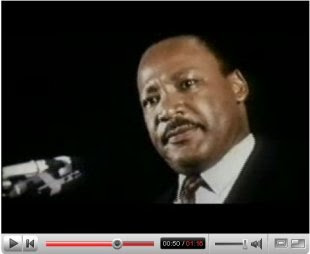
Last speech of MLK
By the time of his death at the hands of an assassin’s bullet in 1968, Dr. Martin Luther King, Jr., had shifted much of the focus of his activism to the issue of economic inequality. His belief that poverty was holding back American society as much as racism is what brought him to Memphis, where he marched with striking sanitation workers fighting for better pay as part of his Poor People’s Campaign. Those workers, like many at the bottom of the economic ladder, were largely African American.
As the nation prepares to honor King this year, the confluence between race and inequality remains a defining factor of the American socio-economic landscape. No matter what indicator you look at — unemployment, income, wealth — African Americans are lagging far behind. Yet despite the occasional media story or academic report on the economic gap between black Americans and everyone else, this pressing crisis is rarely discussed in the national political conversation.
But as we confront the persistence of racial discrimination in the law enforcement and criminal justice systems, it is time for the country to understand that black economic lives matter too. That means any plan to address income inequality in the U.S. must include a serious set of proposals to combat black economic inequality.
Consider these sobering facts:
· The African American unemployment rate is twice as high as that of white Americans.
· During the past 15 years, black workers’ wages have decreased by 44 cents, while Hispanic and white workers’ wages have risen by 48 cents and 45 cents, respectively.
· The typical white household has 16 times the wealth of a black one.
The explanation for these staggering numbers is complex and multi-factorial. But the reality is undeniable: nearly 50 years after King’s death, African Americans remain second-class citizens in the U.S. economic order.
Activists have begun to make progress in some areas. The success of the Fight for 15 campaign, for instance, has raised wages for millions of minimum-wage workers, a disproportionate number of whom are black (as well as Latino and female).
On a smaller scale, local efforts in cities like Los Angeles have proven effective. African Americans have increased their numbers in well-paying union construction jobs thanks to a program known as Construction Careers, which requires the hiring of a certain percentage of local residents from disadvantaged communities.
A similar approach has been used around the country to open the doors to African Americans through union apprenticeship programs that trains people for middle-class careers in energy efficiency. In Los Angeles and other cities with robust tourism industries, activists have also spearheaded the drive to increase African American employment in unionized hotels, where the number of black hotel workers is finally rising after several decades of decline.
One of the most promising opportunities to improve the economic lives of African Americans is the rise of the green economy, which experts predict could create millions of jobs over the next several decades. In 2007, Van Jones introduced the idea of how the fight against climate change could and should be used as a tool to reverse poverty and bring African Americans and other people of color into the middle class. But no large-scale effort has emerged to translate Jones’ vision into reality.
In the past few years, activists have connected the dots between incarceration and economic inequality, specifically with regards to how the large number of African Americans with criminal records has become a huge obstacle to improving the economic prospects in the black community. This has led to the passage of a number of Ban the Box policies, which limit the ability of employers to use previous incarceration as a factor in hiring. Much more needs to be done to delink past criminal records from future employment, even as advocates push to reform law enforcement agencies and the criminal justice system so that fewer people of color end up behind bars in the first place.
As we reflect this year on the legacy of Martin Luther King, the time has come for the nation to confront the injustice of black economic inequality and pursue a comprehensive strategy to combat it. By fighting black poverty and unemployment, reducing the racial wealth gap and lifting African Americans into the middle class, we can show that black lives really do matter.
Cherri Senders is founder and publisher of Labor 411, a Los Angeles-based consumer guide to companies that treat their workers fairly. She can be contacted at cherri@sendersgroup.com.














